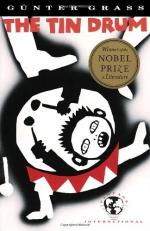|
|
The Tin Drum Chapter 22: Fizz Powder
Oskar begins by talking about fizz powder, a soda substitute of flavored powder that fizzed like soda when mixed with water. Agnes would sell it in little bags of green, orange, raspberry, or lemon flavor.
Oskar and Maria spent the first summer of the war on the beach reserved for ladies. One day, looking for her harmonica, Maria produced a package of fizz powder from her beach bag. Maria grew thirsty, but the water fountain was thirty-five paces away, over burning sand. After a long while, Maria picked up the package, opened it, and placed it back on the towel. Oskar picked it up and held it out to Maria, who put one finger in the package and offered the finger to Oskar. Oskar tasted the powder-covered finger. Maria held out an empty hand and Oskar filled it with powder. Oskar summoned up all of his saliva and spit into the hand full of powder. It fizzed, and Maria felt something she had never felt before. Maria licked her own palm. After a few minutes, she filled her hand again, then made it known that she wanted Oskar's saliva. But Oskar was little; his saliva could not replenish quickly. He had to walk across the burning sand to the water fountain in order to wash out his mouth and replenish his saliva. When he returned, Maria was on her belly and didn't move. Her hand was empty of fizz powder. Oskar never found what had happened to that handful of powder.
Alfred had joined a new skat club with his Party friends, which was to meet two evenings a week. Oskar began to spend those nights at Mother Truczinski's house, and since Oskar refused to sleep on the couch, he was obliged to spend the night in Maria's bed. She whistled, as always, as she undid her braids. She would blow a kiss at the retouched portrait of her father, and would leap into bed. The smell of vanilla put Oskar to sleep. Three days later it was the same routine, but Oskar had put a package of green fizz powder on the quilt. Maria turned off the light but breathed uneasily in the dark at the sight of the powder. Maria switched the light back on, Maria held out her hand, and Oskar readied his saliva. In the next two weeks the two emptied a dozen packages of fizz powder in the bed and mixed it with saliva. Oskar began to get good at summoning saliva; he could make Maria squirm in ecstasy three times with one package.
Although Maria would fall right to sleep after these fizz powder sessions, Oskar found it difficult. He spent all day and all night consulting his drum, his Rasputin-Goethe medley, and his memories of Jan and Agnes for answers to his questions about loving Maria. He says:
"Strange to say, I expected more from literature than from real, naked life. Jan Bronski, whom I had often enough seen kneading my mother's flesh, was able to teach me next to nothing. Although I knew this tangle, consisting by turns of Mama and Jan or Matzerath and Mama, this knot which sighed, exerted itself, moaned with fatigue, and at last fell sickly apart, meant love, Oskar was still unwilling to believe that love was love; love itself made him cast about for some other love, and yet time and time again he came back to tangled love, which he hated until the day when in love he practiced it; then he was obliged to defend it in his own eyes as the only possible love." Chapter 22, pg. 278-279
As Maria quivered and thrashed with the bubbling fizz powder, her nightgown would bunch up until it gathered just below her breasts. One night Oskar filled her navel with powder and spit in it; Maria's reaction was much more intense. Oskar put his tongue inside and tasted raspberries. Maria turned off the light and went to sleep, while Oskar continued. Oskar again felt himself become erect. He questioned the culprit of his actions:
"Who was doing all this: Oskar, He, or I?
And Maria, who was sleeping upstairs and wide awake downstairs, who smelled upstairs of innocent vanilla and under the moss of pungent mushrooms, who wanted fizz powder, but not this little gentleman whom I didn't want either, who had declared his independence, who did just what he was minded to, who did things I hadn't taught him, who stood up when I lay down, who had other dreams than I, who could neither read nor write and nevertheless signed for me, who goes his own way to this very day, who broke with me the first day I took notice of him, who is my enemy with whom I am constrained, time and time again, to ally myself, who betrays me and leaves me in the lurch, whom I should like to auction off, whom I am ashamed of, who is sick of me, who I wash, who befouls me, who sees nothing and flairs everything, who is so much a stranger to me that I should like to call him Sir, who has a very different memory from Oskar..." Chapter 22, pg. 280
Topic Tracking: Individuality/Identity 9
Today, Oskar says, this "little gentleman" is at a loss to recognize Maria.




